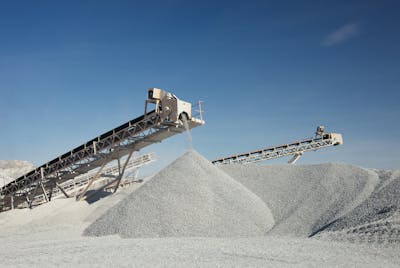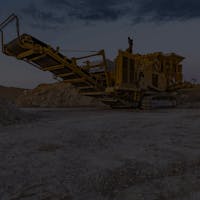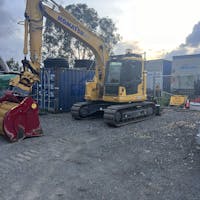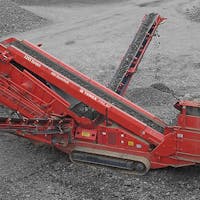Find the Best Crushing and Screening Equipment Near You
- Post a job
- Receive multiple quotes
- Choose your preferred Crushing and Screening Equipment
Where do you need Crushing and Screening Equipment Hire?
Describe your job and our suppliers will send you quotes
Popular Crushing and Screening Equipment Hire Locations
542 Crushers and Screeners for Hire on iseekplant
The demand for crushers and screeners has risen significantly across Australia, driven by infrastructure and mining projects. iseekplant has listed 542 crushing and screening equipment from suppliers across the nation to ensure you find the right equipment for your project.
From jaw crushers for primary crushing applications to vibratory screeners or moving trucks for final product separation and delivery, our platform simplifies the process of finding the right machinery tailored to your needs.
In this quick guide, you'll learn more about the crushing and screening equipment available on our platform. You'll also have a better understanding of the equipment and how much they'll cost on average.
Crushing and Screening Equipment Hire Rates Guide
Understanding the costs of hiring crushing and screening equipment is paramount for your project's planning and budgeting. The rates for hiring these machines vary depending on several factors, including the machine's capacity, brand and the region you're operating in.
Clear understanding of these rates helps your business make informed decisions and ensures optimal utilisation of your resources. Below are the standard rates and capacities for different crushing and screening equipment:
| Equipment Type | Capacity | Wet Hire Rate (per hour) | Dry Hire Rate (per hour) |
|---|---|---|---|
| Jaw Crusher | 30-50 TPH | $150 - $250 | $120 - $200 |
| Cone Crusher | 100-300 TPH | $180 - $300 | $150 - $270 |
| Vibratory Screener | 60-120 TPH | $130 - $220 | $110 - $190 |
| Horizontal Screener | 100-250 TPH | $140 - $230 | $115 - $200 |
Note: Rates vary depending on the machine's age, brand, location within Australia and additional project requirements. All prices listed on this page are estimates, exclude GST and are in AUD.
As always, the rates here are estimates and may vary per supplier. Use our Get a Quote tool to connect with a crushing and screening equipment supplier to get an accurate, customised quote based on your project today!
Types of Crushers (with Capacities)
Crushers are fundamental in breaking down large chunks of materials into smaller, more manageable sizes. Each crusher type has its unique mechanism and application, with its capacity indicating the volume it can process within a specific time.
Knowing the capacities of different crushers is critical when determining the best equipment for your project's scale and nature. The table below shows standard jaw, cone, gyratory or impact crushers, their capacities and the most popular brands and models:
| Crusher Type | Description | Capacity Range (tons/hour) | Popular Brand and Model |
|---|---|---|---|
| Jaw Crusher | Suitable for primary crushing; breaks material by squeezing it between two jaw plates | 10t - 1,200t | Terex Finlay J-1175 |
| Cone Crusher | Used for secondary crushing; uses compressive force to crush material | 20t - 1,000t | Metso Nordberg Lokotrack LT1213 |
| Impact Crusher | Best for soft to medium-hard materials; uses impact to break material | 15t - 800t | Sandvik QH331 |
| Gyratory Crusher | Used for hard and abrasive materials; has a central vertical spindle | 100t - 14,000t | Metso Superior MKIII |
Types of Screening Equipment (with Capacities)
Screening equipment is crucial in segregating crushed materials based on size. Different screeners cater to varying requirements, with their capacities showing the volume of materials they can process per hour.
Understanding the different types and their respective capacities will help you choose the appropriate screener for a project. Here are the common screening equipment, capacities and notable brands you'll find in many mining operations all over the country:
| Screener Type | Description | Capacity Range (tons/hour) | Popular Brand and Model |
|---|---|---|---|
| Vibratory Screener | Uses vibration to separate materials based on size | 10t - 400t | Sandvik QA451 Triple Deck |
| Rotary Screener | Also called trommel screen; best for bulky materials; uses a rotating cylinder with perforations | 70t - 200t | Doppstadt SM 620 Plus |
| Grizzly Screener | Ideal for primary separation; uses a series of parallel bars | 100t - 1,000t | Metso VF Series™ VF661 |
| Dewatering Screen | Removes water from granular materials | 30t - 200t | McLanahan VD18 Double Deck |
| Horizontal Screener | Suited for wet or dry applications; screens material in a horizontal manner | 150t - 2,500t | Telsmith Valu-King® 4x10 |
Types of Conveyors
Conveyor belts ensure the seamless transfer of crushed and screened materials between different stages of the crushing process. Various conveyor types cater to different project requirements, be it the nature of the material, the volume to be transported or the distance covered.
Recognising the different types of conveyors and their applications can make material handling more efficient and effective. These conveyor types and the most notable brands and models find home in operations nationwide:
| Conveyor Type | Description | Length Range (metres) | Most Popular Brand & Model |
|---|---|---|---|
| Belt Conveyor | Uses continuous belts to convey products or material | 10-200 | Fenner Dunlop Series 500 |
| Screw Conveyor | Transfers material using a helical screw blade | 3-12 | WAM ES Series Screw Conveyors |
| Chain Conveyor | Utilises a powered continuous chain arrangement | 5-50 | Rexnord Apron Conveyors |
| Roller Conveyor | Uses rollers to move materials; often unpowered | 1-20 | Hytrol Gravity Roller |
Ready to Start Your Crushing and Screening Project?
iseekplant is your trusted partner in sourcing the best equipment for your project needs. Our vast network ensures you'll find the perfect match in no time. Whether you need a crusher for a small-scale project or mobile screening equipment for a major mining operation, we've got you covered.
For assistance or enquiries, reach out at projects@iseekplant.com.au or call 1300 691 912. Ready to hire? Click Get a Quote now.
Become a supplier
Recent Crushing and Screening Equipment Hire reviews
"Great service, prices and very knowledgeable on all plant and machinery, would definitely recommend"
- RobertView profileHow It Works
Crushing and Screening FAQs
Here are some frequently asked questions and tips on how to find the right crusher and screener for your job.
What do we have to offer?
Want to Know More?

Top 3 Best Crushing and Screening Equipment Brands
What are the best crushing and screening equipment brands in Australia? ...


